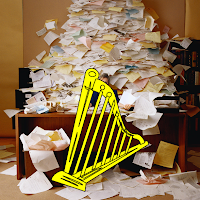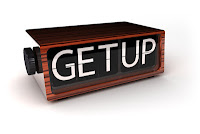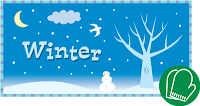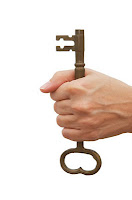What does the space in which you practice look like? Is it warm and inviting, beckoning you to come play? Or does it look the bigger cousin of the kitchen junk drawer?
 What you put around you impacts your time at the harp. And since none of us has enough time at the harp, we need to make sure our surroundings help us maximise that time rather than gnawing on our conscious or our unconscious thought.
What you put around you impacts your time at the harp. And since none of us has enough time at the harp, we need to make sure our surroundings help us maximise that time rather than gnawing on our conscious or our unconscious thought.
No matter whether you have an entire wing of your house devoted to enshrining your harp or if you have your harp wedged into a corner, you should make sure that your surroundings help you play, practice, grow, and enjoy.
So, here are four things you can do to improve your space so that you enjoy being there more and get better performance from yourself while you are there.
1. Make the space inviting and comfortable. This is clearly personal and you should make the space yours. There are number of things that can make the space better for you. Make sure you have good lighting. Have enough space to safely play and store your harp. Will the dog run through and knock it over? Do you have enough room for your bench. If you have a small space, be sure you have enough room for good form and technique throughout the range of the harp (when you play the top strings, are your elbows brushing the walls? Then move!). You may have to move the furniture around (but since its not a harp, I’m sure no one will notice or care!).
2. Have on hand the things you will need – eventually. You know you need a tuner and lighting and space for your harp. But there are other things you need to store nearby as well – music? music stand? extra strings? a string chart? whatever other bits and bobs you want to have there. Make sure those things are easily accessible so you have them when you need them. For instance, if a string breaks during your practice, it might not be enough to have the strings close by, you might also need string ends, candle gum, pliers, et autre accoutrement.
3. Of course having things near by means your must have a place to put those things. And that you actually put them in their place when not in use! Organizing your things will keep the space tidy so it won’t be a distraction while you’re practicing.
4. Use the space you have to do the things you do. If you don’t just play but also have people listen, you’ll need a comfortable place for them to sit. If you do a lot of arranging, you’ll need a place for your pens and pencils, manuscript paper, erasers (if you’re at all like me!). If you do recording, you’ll need the recorder itself and a stand or table.
Each of us uses our harps and the space in a very personal way. Make sure you organize your space so you can accomplish all you want to without having to “fight” the room to make your accomplishments.















